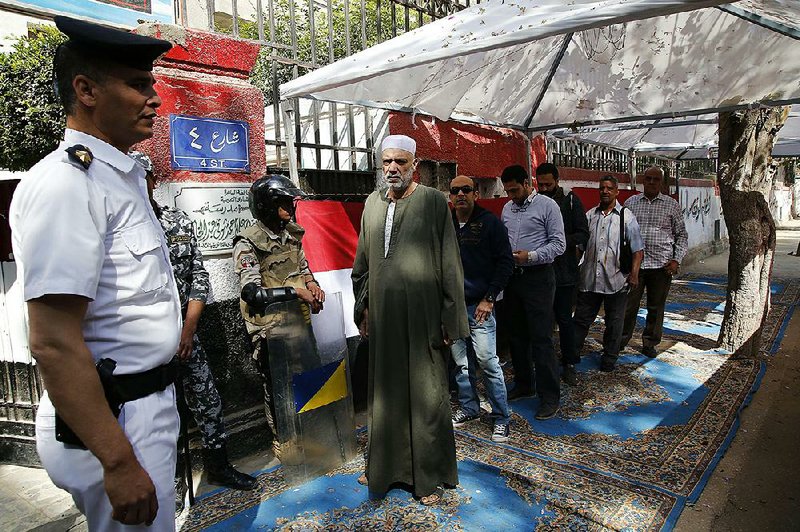CAIRO -- Egyptians cast their ballots Saturday on the first of three days of voting on constitutional amendments that would broaden the military's role and allow President Abdel-Fattah el-Sissi to stay in power until 2030.
Critics have blasted the proposed changes as a step toward an authoritarian government perhaps even more severe than that of former President Hosni Mubarak, whose nearly three decades of autocratic rule was ended by a popular uprising in 2011.
The nationwide referendum came amid an unprecedented crackdown on dissent in recent years. El-Sissi's government has arrested thousands of people, including Islamists and secular activists, and rolled back freedoms won eight years ago.
Voting will stretch over a period of three days to allow maximum turnout, which the government is hoping will lend legitimacy to the referendum.
Mahmoud el-Sherif, spokesman of the National Elections Authority, said more than 61 million people are eligible to vote. Results were expected within a week, el-Sherif said in a news conference.
Outside a polling center near the Giza pyramids, around two dozen people, mostly elderly women, lined up and waited to cast their votes. Heavy police and army security was reported at polling stations throughout the country.
Haja Khadija, 63, said she was there for the "security and stability" of the country.
"We love el-Sissi," she said. "He did lots of things. He raised our pensions."
Omar Knawy, who writes novels, voted "no" in the referendum. He said he opposes most of the changes, especially those that would enable el-Sissi to stay in power beyond his current second four-year term. Knawy also opposes articles that declare the military the "guardian and protector" of the Egyptian state, democracy and the constitution.
Casting his ballot Saturday, Prime Minister Mustafa Madbouly urged voters to turn out in high numbers.
State-run TV said el-Sissi voted in Cairo's Heliopolis district, near the presidential palace. El-Sissi, who has repeatedly said he won't stay in office any longer than the people want him to, hasn't commented on the proposed amendments.
Since early April, the Egyptian capital has been awash with large posters and banners encouraging people to vote in favor of the changes. Most of the posters were apparently funded by pro-government parties, businessmen and lawmakers.
Parliament, packed with el-Sissi supporters, overwhelmingly approved the amendments on Tuesday, with only 22 "no" votes and one abstention from the 554 lawmakers in attendance. The national electoral commission announced the following day that voting would begin Saturday.
The proposed changes are seen by critics as another step toward authoritarianism. The referendum comes eight years after the pro-democracy uprising that ended autocrat Mubarak's three-decade rule, and nearly six years after el-Sissi led a popular military overthrow of the country's freely elected but divisive Islamist president, Mohammed Morsi.
"Egypt's autocracy is shifting into overdrive to re-establish the 'President-for-Life' model, beloved by dictators in the region and despised by their citizens," said Michael Page, deputy Middle East and North Africa director at Human Rights Watch. "But it's a model that recent experience in Egypt and neighboring countries has demonstrated is not built to last."
The Civil Democratic Movement, a coalition of liberal and left-leaning parties, urged people to participate in the referendum by voting "no."
The coalition said it used social media to spread its message, noting that it was banned from hanging banners in the streets to call for voters to reject the amendments.
The amendments would extend a president's term in office from four to six years and allow for a maximum of two terms. But they include an article specific to el-Sissi that would extend his current second four-year term to six years and allow him to run for another six-year term in 2024 -- potentially extending his rule until 2030.
El-Sissi was elected president in 2014 and was re-elected last year after all of his top potential challengers were either jailed or pressured to exit the race.
The amendments also would allow the president to appoint top judges and would grant military courts wider jurisdiction in trying civilians.
In the past three years, more than 15,000 civilians, including children, have been referred for military prosecution in Egypt, according to Human Rights Watch.
The amendments also would introduce one or more vice presidents, revive the senate and enshrine a 25 percent quota for women in what would become parliament's lower, legislative chamber. Provisions on all three were dropped from the country's constitution after the 2011 revolution.
A Section on 04/21/2019
